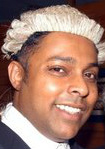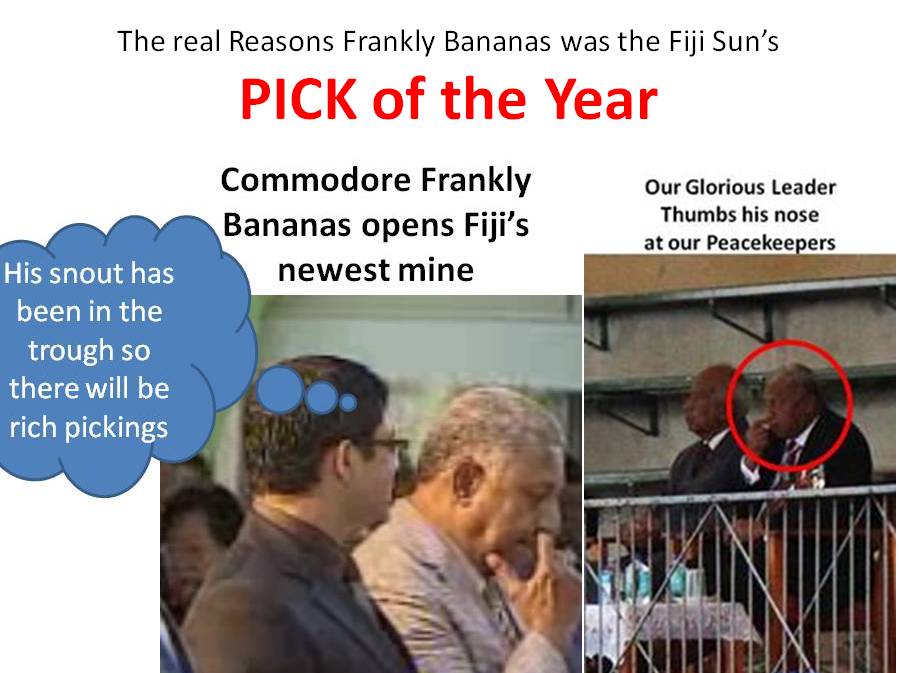Martin Luther King: "Change does not roll in on the wheels of inevitability, but comes through continuous struggle. And so we must straighten our backs and work for our freedom. A man can't ride you unless your back is bent. It is time to stand up and to say that the regime is unlawful, oppressive and undemocratic."

1. Trashing the Ghai constitution – this document was arrived at by input of the people nationally. It was rejected, Ghai was threatened and left Fiji fearing for his life. The regime then came up with its sham document and purported to consult people – an exercise in telling rather than listening to the people. This act early in 2013 was a harbinger of things to come.
2. PWD workers decision – Judge Anjala Wati sat on a simple leave application for judicial review for 12 months and dismissed the application for reasons which were flimsy at best. For judges to take 12 months to rule on such a straightforward application raises serious questions about the competence of certain officers. It also shows a judiciary that is cowering in fear of the illegal regime and does not have the courage to show determination to rule independently on matters of law.
3. PPRD – the illegal regime, in order to cling to power sought to make a decree to regulate political parties. Its draconian provisions would remove any independence and free will of political parties. It would make political parties subservient to the regime and parties could be suspended at any time. This was challenged in the High Court but Judge Anjala Wati ruled that the judiciary could not strike out parts of decrees which were oppressive. This decision was internationally condemned and severely embarrassed Wati, who fled to Labasa to hide in shame.
4. Sugar industry – was again in the doldrums despite the spin by FSC. Sugar production is at an all time law and as the industry suffered Bainimarama was appointed Chair of the ISO and apart from hosting sugar leaders at plush hotels at taxpayers’ expense and giving prepared speeches did little else. Farmers continue to be burdened by high costs of production and unrepresented as an occupation group.
5. Economy – an accurate assessment of economic performance is very difficult given the regime’s refusal to release figures and allow independent bodies to audit government accounts. Unemployment remains high at close to 10% and the cost of living has put many basic items out of the reach of ordinary citizens. A plethora of taxes keep being imposed on the people without discussion or support. The Commerce Commission has become a regime bunny and has consistently failed to perform its statutory duties.
6. Vote buying – to win electoral support, the illegal regime has tried to address infrastructure issues in rural areas. What people of Fiji should have as of right i.e. water, electricity and roads, was made out to be a political issue with Bainimarama seeking to criticize past leaders (democratically elected leaders) quite unfairly. Many projects have been financed through expensive loans and for which no acquittals have been provided to date.
7. Attacks on chiefs/ church – the people saw such attacks by Bainimarama on numerous occasions. Such unjustified attacks show a very scared man who seeks to blame the chiefs and the church to cover up for his acts of murder, theft and treason. The chiefs/ church have maintained a very dignified silence but are working privately through traditional channels to do the needful at the September 2014 elections.
8. Torture of prisoners – the nation and the world was disgusted with the video of police and army officers beating captured prisoners. The beatings were horrific and some 5 months after the video aired there has been no arrest. Bainimarama has publicly sided with the regime law enforcement thugs. The Police mouthpiece Rusiate Tudravu, as usual waffles on this from one day to another. Bainimarama’s support for such law breakers shows his contempt for the law. This man cannot be trusted to up hold the law when he endorses such acts of brutality. For the first time the people of Fiji heard a regime leader condoning rather than criticizing such acts. It lent great support to charges of Bainimarama’s involvement and sanction of beatings and murder of the CRW soldiers in 2000.
9. Media – the less said about the media the better. The media in Fiji has become pliant and subservient to the illegal regime. The Fiji Sun’s Maika and Jyoti and Fiji Village reporter Vijay Narayan are prime example of regime suckers, who are a shame to the profession of journalism.
10. Salaries – the people saw an elusive regime when calls were made for disclosure of ministers’ salaries. This was seen as the height of hypocrisy from a regime which often has a habit of accusing others of being non transparent. The mega salary increases to senior civil servants showed a regime which held fiscal policy with contempt. Salaries of $160 – 220,000.00 cannot be justified by any stretch of the imagination and is an attempt to buy the loyalty of senior civil servants in the lead up to the polls. The salary increases to ordinary civil servants, police and military was clearly not enough given the high cost of living under seven years of the illegal regime.
11. Harassment of businesses – FIRCA and FNPF, it their desire to raise revenue for the illegal regime’s irresponsible expenditure harasses and harangues hardworking businesses for advance taxes and levies and is trigger happy in effecting DPOs. Many businesses have since scaled down and a lot of smaller businesses have actually shut shop.
12. Still playing the race card – Bainimarama’s address to the military corps a fortnight ago was boring and full of the usual rhetoric. Blaming chiefs and church, blaming politicians and blaming racial politics. None of these are or have been an issue. Soldiers were ordered to tow the regime line or to leave. Race has never been an issue and cannot be used to justify Bainimarama’s usurpation of power from a democratically elected government and of the murder of the CRW soldiers and civilians such as Verebasaga and Rabaka. This man must be held to account for these high and serious crimes.
13. Driti – the Driti trial showed that the opinions of assessors are irrelevant under the illegal regime. Like Mac Patel, Driti was found not guilty by all 3 assessors only for such verdict to be overturned by judge Madigan on a matter relating to facts – something which assessors are tasked at determining. The trial of Driti confirmed what many had started to believe – that Khaiyum was leading the country astray and Bainimarama had strayed from the 2006 takeover principles. Ironically, the trial also debunked the myth that any soldier was protected by any immunity clause. Soldiers are understandably nervous and untrusting of Bainimarama.
14. The BaiYum con-stitution – this heinous and arbitrary document was foisted on the people in September 2013. Gone was the recognition of the GCC and its role in nation building. Gone were the entrenched provisions as it related to native land. What had been included in this farcical document was an entrenched immunity provision for past, present and future acts of soldiers. The penny had finally dropped and the people woke up to the fact that Bainimarama and Khaiyum were in self preservation mode with the immunity clause. This sham document will become the supreme law of Fiji from tomorrow.
Many believe that there will be no elections come 2014. Bainimarama is in a real bind come 2014. He has to retire in April 2014 from the military, having reached retirement age. He has indicated an intention to form his own political party but many are rightly skeptical. However, his retirement from the military will place him on the same platform as any platform.
There is no guarantee that any new Commander RFMF will align himself to Bainimarama or the regime. It also goes without saying that Bainimarama has little if any political base or capital on his own. He will be, come April 2014, literally an Emperor without his (military) clothes.
So friends, 2013 has been a year of change. Critics may mock us but we have been and remain committed to change and to a free, fair and democratic Fiji. For it is better to have and to continue to try than not to have tried at all. As the great American civil rights leader Martin Luther King once said: "Change does not roll in on the wheels of inevitability, but comes through continuous struggle. And so we must straighten our backs and work for our freedom. A man can't ride you unless your back is bent. It is time to stand up and to say that the regime is unlawful, oppressive and undemocratic."
It has been a year of change in the minds of the people and most importantly, in the minds of the soldiers and others who believed in the 2006 cause. The die has been cast. Bainimarama’s end is nigh. Martin Luther King Jr famously said: “The arc of the moral universe is long, but it bends towards justice.” Bainimarama must be subjected to the rule of law in 2014 and is non negotiable.
2014 is a year of promise. It will be the year where Fiji will rid itself of tyranny and become a democratic and constitutional democracy. Let us continue to be part of the journey.
A happy and safe 2014 to everyone.

December 31, 2013
By MAIKA BOLATIKI
It’s no contest.
The Fiji Sun has chosen Prime Minister Commodore Voreqe Bainimarama as Fiji’s Person of the Year. And how could anyone else even be considered?
It follows a remarkable year of gains, successes and recognition for the PM at local, regional and international level.
This was without doubt the Year of our Prime Minister. It underscored all he is doing leading his Government in building a new and better Fiji. A Fiji where all are equal and governance is truly democratic.
LOCALLY
Locally one of Commodore Bainimarama’s highest priorities as Prime Minister was to ensure that the Government delivers services to its citizens efficiently, equitably, and enthusiastically.
Better transport (such as the roads), education, health services, and power and water supplies are amongst his priorities.
The long list of service delivery successes this year is truly helping build a better nation. Nowhere was this better illustrated than in the dramatic free education reforms. These are designed to give all our young people a chance to grow in a smarter Fiji.
Everything in fact the Prime Minister did was designed to be in best interests of Fijians and to give them a lift up in life.
He was same time very much a Prime Minister of the People, travelling constantly, especially in the rural areas, He met the people and listened to them and their concerns in his “talanoa” sessions. Then he made sure there was follow up.
Rural people – so long used and then neglected by politicians of the past – responded. Some called for Commodore Bainimarama to just stay in power and not hold elections in the year ahead.
But that is not going to happen. Those elections are something the Prime Minister is also determined to deliver in 2014 – as promised.
The Constitution is in place. Voter registration is a continuing success. Structures are steadily taking shape. Even the most diehard of doubters in the international community are now believing.
REGIONALLY
Regionally Fiji continued to take a major leadership role.
The Prime Minister’s leadership invigorated the Melanesian Spearhead Group. This is an emerging economic bloc the likes of which the region has never seen before.
The acclaimed Pacific Islands Development Forum (PIDF) was formed under his leadership. This is a body which is rapidly replacing the fading Pacific Islands Forum as the true meaningful regional body.
INTERNATIONALLY
Internationally the Prime Minister was elected chair of the G77 plus China group and gave Fiji an unprecedented stature on the world stage. To say Fiji punched above its weight is no cliché.
This was no better epitomised than when he was one of the first United Nations leaders to meet with the newly-elected President of Iran, Hassan Rouhani. And to have his photo taken with him.
Likewise, he was one of the first leaders invited to China to meet the new leadership there. Fiji-China relations continue to strengthen, and Fiji to benefit.
Then there was Commodore Bainimarama’s leadership of the International Sugar Organisation. There he spoke strongly from the heart for the cane growers – and against efforts by vested interests to politicise sugar.
He also put climate change and its impact on the Pacific Islands firmly on the agenda at the forums he chaired.
This has been a remarkable year for a remarkable leader. Fiji and Fijians are much the better for it.


